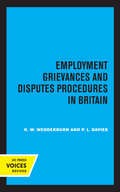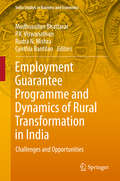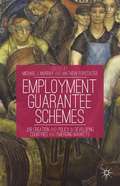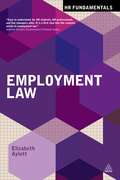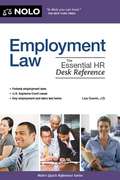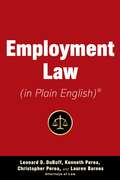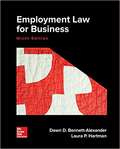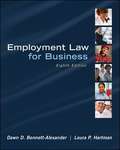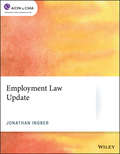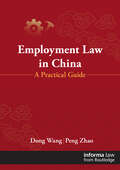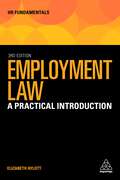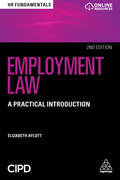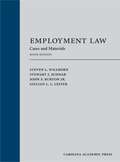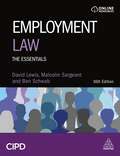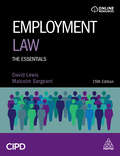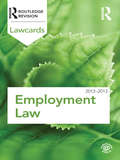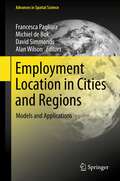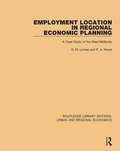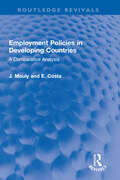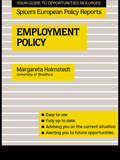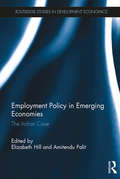- Table View
- List View
Employment Grievances and Disputes Procedures in Britain
by K.W. Wedderburn P.L. DaviesThis title is part of UC Press's Voices Revived program, which commemorates University of California Press’s mission to seek out and cultivate the brightest minds and give them voice, reach, and impact. Drawing on a backlist dating to 1893, Voices Revived makes high-quality, peer-reviewed scholarship accessible once again using print-on-demand technology. This title was originally published in 1969.
Employment Guarantee Programme and Dynamics of Rural Transformation in India: Challenges and Opportunities (India Studies in Business and Economics)
by Cynthia Bantilan P. K. Viswanathan Madhusudan Bhattarai Rudra N. MishraThis book offers an assessment of the performance, impact, and welfare implications of the world’s largest employment guarantee programme, the Mahatma Gandhi National Rural Employment Guarantee Act (MGNREGA). Launched by the Indian government, the programme covers entire rural area of the country. The book presents various micro-level analyses of the programme and its heterogeneous impacts at different scales, almost a decade after its implementation. While there are some doubts over the future of the scheme as well as its magnitude, nature and content, the central government appears committed to it, as a ‘convergence scheme’ of various other welfare and rural development programmes being implemented at both national and state level. The book discusses the outcomes of the programme and offers critical insights into the lessons learnt, not only in the context of India, but also for similar schemes in countries in South and South-East Asia as well as in Africa, and Latin America. Adopting inter-disciplinary perspectives in analysing these issues, this unique book uses a judicious mix of methods---integrating quantitative and qualitative tools---and will be an invaluable resource for analysts, NGOs, policymakers and academics alike.
Employment Guarantee Schemes
by Michael J. Murray Mathew ForstaterMost of the scholarship on the Job Guarantee up to now has been in the context of industrialized nations such as the United States and Australia. Employment Guarantee Schemes directs attention to challenges and opportunities of enacting direct job creation policies in developing countries and BRICS, including China, Ghana, Argentina, and India. This book also investigates how the Job Guarantee might interface with other policy goals, such as environmental sustainability. Eschewing narrow individualistic and economistic approaches, these interdisciplinary, historical, and comparative studies delve deeper into how both unemployment and true full employment can affect community.
Employment Law
by Elizabeth AylottEmployment Law is a practical guide to understanding and applying the law effectively at work. Tailored to the needs of practitioners it offers a complete overview of the fundamentals of employment law, examining its importance for an organization, its employees and the HR function. Using a combination of practical tools, assessments, scenarios and case studies from best practice it will build your legal knowledge of key areas including immigration, employing temporary staff, changing contracts, discrimination, equal pay, family rights, redundancy and much more. By aligning compliance to legal requirements with the strategic objectives of your organization it will equip you with the crucial skills and knowledge you need.
Employment Law
by Lisa Guerin J.D.If you're a human resources professional, it's important that you have quick access to the information you need to do your job. Enter Nolo's latest quick reference guide, Employment Law: The Essential HR Desk Reference, the all-in-one, easy-to-read guide every HR pro should have handy. From Absenteeism to Zero-Tolerance Policy, read entries on topics such as: Bereavement Leave Class Action Ergonomics Hostile Work Environment Minimum Wage Privacy Stock Options Trade Secret Whistleblower ...and much more In usual Nolo fashion, Employment Law combines legal and practical information that can be used in real-world HR situations. Real-life case references, statistics, trends, and even pop culture references help to illustrate each entry's summary of the law. Let this guide, the latest in Nolo's Quick Reference series, give you easy and affordable access to the information you need.
Employment Law (In Plain English)
by Leonard D. DuBoff Christopher Perea Kenneth A. Perea Lauren BarnesEmployment Law (in Plain English)®provides both employers and employees the information they need in order to understand the law as it relates to their working relationship. This helpful guide will enable readers to identify and prevent many of the issues which can and do occur in the employment context, thus saving everyone valuable time and money and establishing a stronger workforce. While this book is not intended to replace the reader&’s employment lawyer, it will provide the ability to assist one&’s lawyer in litigation should the need arise. Chapters discuss a variety of topics including: Advertising for new positions and vacanciesInterviewing, hiring, and other pre-employment considerationsEmployment contractsUnion shopsCollective bargaining agreementsEmployee handbooksFirst day on the jobWages hours and other terms and conditions of employmentOn-the-job rights and responsibilitiesEmployee dignity, privacy, and reputationOwnership of work created by employeesPrivate employment versus public employmentInternet concernsVirtual officesEmployees versus independent contractor statutesDiscipline and termination of the employment relationshipDispute resolutionFringe benefitsHow to find a lawyer In easy-to-understand terms and with plenty of examples, this essential handbook supplies readers with invaluable insights on the legal nature of their working relationships.
Employment Law 9e: The Essentials
by David Lewis Malcolm SargeantPacked with a wealth of case law and legislation, this book will enable you to fully understand the intricacies of this fast-changing subject with ease. With features such as chapter summaries and further reading suggestions, Employment Law is well-suited to support you in your studies. The ninth edition has been fully updated to include coverage of the latest legislative and case law developments, including: • Issues around shared parental leave • The national living wage • Legal developments in the area of non-standard work Offering comprehensive coverage of all the key aspects of individual and collective employment law in a clear and accessible way, Employment Law is ideal for both LLB and HRM students.
Employment Law For Business
by Laura Hartman Dawn Bennett-AlexanderBennett-Alexander and Hartman's Employment Law for Business addresses employment law and employment decisions from a managerial perspective. This textbook shows students how to manage effectively and efficiently, with full comprehension of the legal ramifications of their decisions. Students learn to analyze employment law facts using concrete examples of thorny management-related legal dilemmas. The authors illustrate the various methods that can be used to reach a resolution, so that students understand how to make their own business decisions based on legal considerations. <p><p> The text discusses the complicated issues today's businesses face, such as whether employers are liable if they didn't know a supervisor was sexually harassing an employee and whether an employer is liable for racial discrimination for terminating a black male who refuses to abide by a "no-beard" policy. These types of questions, which are routinely decided in workplaces every day, can have devastating financial and productivity consequences if mishandled by employers. Yet, few employers or their managers and supervisors are equipped to handle them well. <p> This ninth edition has been updated to include cases such as the 2015 U.S. Supreme Court pregnancy case, Young v. UPS, and the 2015 U.S. Supreme Court Obergefell decisions prohibiting states from banning gay marriage, as well as current events, such as the 2016 presidential election and its effect on employment decisions. This edition also provides more in-depth coverage of recent issues, including technology and hiring assessment tools, criticisms of drug testing, and gender and age discrimination claims.
Employment Law For Business
by Dawn D. Bennett-Alexander Laura Hartman<P>Bennett-Alexander and Hartman's Employment Law for Business, addresses law and employment decisions from a managerial perspective.<P> It is intended to instruct students on how to manage effectively and efficiently with full comprehension of the legal ramifications of their decisions.<P> Students are shown how to analyze employment law facts using concrete examples of management-related legal dilemmas that do not present clear-cut solutions.<P> The methods of arriving at resolutions are emphasized, so that when the facts of the workplace problem are not quite the same, the student can still reach a good decision based on the legal considerations required by law, which remain relevant.
Employment Law Update (AICPA)
by Jonathan IngberProtect clients' assets and shield their estates from increased taxation brought about by changing tax laws. This book can help you to understand the tax obligations of trusts and estates and how these obligations affect beneficiaries. It provides exercises and examples that reflect the calculation and allocation of taxable income and its presentation on the appropriate forms. In addition, you will also learn how to prepare federal Form 1041, US Income Tax Return for Estates and Trusts. Key topics covered include: How are trusts and estates taxed under the internal revenue code? What is a trust? What is a "simple trust?" What is a "complex trust?" How is the "income" of a trust or estate defined for tax purposes? What are the ordinary deductions and credits allowed? How is the "deduction for distributions" to beneficiaries determined? How are trust and estate beneficiaries taxed? What is a "grantor trust" and how is it taxed? How to prepare Form 1041.
Employment Law in China: A Practical Guide
by Dong Wang Peng ZhaoThis book provides clear and concise explanations to over 200 questions on China’s current employment laws. It helps readers answer the question: “What are my rights and what should I do?” in given practical situations.Adopting a question-and-answer format, the book covers a wide range of topics including labor dispute procedures, employer obligations and immunities, employee entitlements, work injuries, wages, misconduct, and termination. In addition to employment law, the book also includes interdisciplinary material on trade secrets, non-competition, personal information protection, and administrative and criminal liabilities.The book provides advice in the form of direct answers that set out the statutory principles, legal analysis, conclusion, and comments. It carefully selects and cites over one thousand court cases to illustrate employment law practice and the legal consequences of specific issues. It also distinguishes the different local regulations and judicial practices across provinces and cities.This book is written for readers who are familiar with general concepts but may not have formal knowledge of the law. To this purpose, it will be a valuable resource for business owners, employees, and HR specialists. It will also appeal to legal scholars and professionals who provide corporate legal counsel.
Employment Law: A Guide to Hiring, Managing, and Firing for Employers and Employees
by Lori B. RassasEmployment Law: A Guide to Hiring, Managing, and Firing for Employers and Employees offers a coherent overview that follows the sequence of day-to-day events--from job creation to recruitment, including compensation and benefits, leave entitlements, and more.
Employment Law: A Practical Introduction (HR Fundamentals #21)
by Elizabeth AylottThe updated third edition of Employment Law is a clear and practical guide to understanding the complex, important system that regulates the relationship between employers and employees in the UK.Understanding and applying the law effectively at work is essential for organizations. Employment Law offers a complete overview of the core components that form the interactions between an organization, its employees and the HR function. The third edition includes the latest developments and changes in law and HR perspectives, with new material on the changeability of the law, equal pay and parental leave.Featuring practical tools, checklists, case studies and real-life examples, Employment Law builds legal knowledge in key areas including recruitment, contracts, discrimination, equal pay, health and safety and managing the end of the employment relationship. It is supported by case studies on topics such as early conciliation, implied rights and diversity and inclusion and online resources including person specification templates and appraisal forms and additional references.HR Fundamentals is a series of succinct, practical guides featuring exercises, examples and case studies. They are ideal for students and those in the early stages of their HR careers.
Employment Law: A Practical Introduction (HR Fundamentals)
by Elizabeth AylottWhile recognized to be an important system that regulates the relationship between employers and employees, to many, the world of employment law can seem complex and confusing. Employment Law is a clear and practical guide to understanding and applying the law effectively at work in the UK. It offers a complete overview of the fundamentals of employment law, exploring its importance for an organization, its employees and the HR function. Using a combination of practical tools, checklists, case studies and real-life examples, it builds legal knowledge in key areas including recruitment, contracts, discrimination, equal pay, health and safety and managing the end of the employment relationship.This fully revised second edition of Employment Law is updated to include the latest developments and changes in law and HR perspectives. It contains new material on employment statuses, Gender Pay Gap Reporting, Shared Parental Leave, the General Data Protection Regulation (GDPR), and disability discrimination, which is supported by updated case studies and a suite of new online resources. HR Fundamentals is a series of succinct, practical guides for students and those in the early stages of their HR careers. They are endorsed by the Chartered Institute of Personnel and Development (CIPD), the UK professional body for HR and people development, which has over 145,000 members worldwide.
Employment Law: Cases And Materials
by John Burton Steven Willborn Stewart Schwab Gillian LesterThe Sixth Edition of Employment Law will continue the volume¿s focus on important unifying themes in employment law, such as the struggle for authority in the workplace between employers, employees, and the government, the relationship between employment law and labor markets, and the appropriate remedies for employment law violations.
Employment Law: Cases and Materials 2nd edition
by Steven L. Willborn Stewart J. Schwab John F. BurtonInformative overview of Employment Laws.
Employment Law: Eighth edition
by David Lewis Malcolm SargeantOffering comprehensive coverage of all the key aspects of individual and collective employment law in a clear and accessible way, Employment Law is ideal for both LLB and HRM students. Packed with a wealth of case law and legislation, this book will enable you to fully understand the intricacies of this fast-changing subject with ease. With features such as chapter summaries and further reading suggestions, Employment Law is well suited to support you in your studies. The eighth edition has been fully updated to include coverage of the latest legislative and case law developments, including: Issues around shared parental leave The national living wage Legal developments in the area of non-standard work
Employment Law: The Essentials
by Malcolm Sargeant Ben Schwab David Balaban LewisEmployment Law is the core textbook for the CIPD Level 7 module of the same name. Easy to read, jargon-free and full of case studies and useful examples this fully updated 16th edition provides a thorough grounding in UK employment law and how it applies in practice. This definitive guide covers everything students need know to excel at their studies and begin a successful career as an HR professional. It covers the formation of the Contract of Employment, recruitment and selection, parental rights, discrimination and health and safety in the workplace. There is also essential coverage of unfair dismissal and redundancy. This new edition is completely up to date with the latest cases and legislation including updates to discrimination law and working time. There is also guidance on the legal implications of Brexit such as freedom of movement, workers' rights and the change to procedural arrangements for the final court of appeal in UK cases. Reflective activities, case studies and explore further boxes encourage critical thinking, broader engagement with the topic and a clear understanding of how employment law applies in practice, Online resources include a lecturer guide, powerpoint slides and extra case studies to support learning and enable students to apply the theory in practice.
Employment Law: The Essentials
by Malcolm Sargeant David Balaban LewisEmployment Law is the core textbook for the CIPD Level 7 Employment Law module. It takes the reader step-by-step through everything that they need to know, including the formation of the Contract of Employment, discrimination, health and safety in the workplace, unfair dismissal and redundancy. Easy to read and navigate, and full of case studies and useful examples that encourage deeper thinking, this fully updated 15th edition provides a thorough theoretical grounding in employment law that can be applied in practice.This new edition of Employment Law is completely up to date with the latest cases and legislation, including zero hours contracts, migrant workers' rights, shared parental leave and Brexit and provides an up-to-date analysis of anti-discrimination law, the national living wage and the 'Transfer of Undertakings (Protection of Employment) Regulations 2006' (TUPE). Online resources include a lecturer guide, powerpoint slides, multiple choice questions and extra case studies to support learning and enable students to apply the theory in practice.
Employment Lawcards 2012-2013 (Lawcards)
by RoutledgeRoutledge Lawcards are your complete, pocket-sized guides to key examinable areas of the undergraduate law curriculum and the CPE/GDL. Their concise text, user-friendly layout and compact format make them an ideal revision aid. Helping you to identify, understand and commit to memory the salient points of each area of the law, shouldn’t you make Routledge Lawcards your essential revision companions? Fully updated and revised with all the most important recent legal developments, Routledge Lawcards are packed with features: Revision checklists help you to consolidate the key issues within each topic Colour coded highlighting really makes cases and legislation stand out Full tables of cases and legislation make for easy reference Boxed case notes pick out the cases that are most likely to come up in exams Diagrams and flowcharts clarify and condense complex and important topics '...an excellent starting point for any enthusiastic reviser. The books are concise and get right down to the nitty-gritty of each topic.' - Lex Magazine Routledge Lawcards are supported by a Companion Website offering: Flashcard glossaries allowing you to test your understanding of key terms and definitions Multiple Choice Questions to test and consolidate your revision of each chapter Advice and tips to help you better plan your revision and prepare for your exams Titles in the Series: Commercial Law; Company Law; Constitutional Law; Contract Law; Criminal Law; Employment Law; English Legal System; European Union Law; Evidence; Family Law; Human Rights; Intellectual Property Law; Jurisprudence; Land Law; Trusts Law
Employment Location in Cities and Regions
by Alan Wilson David Simmonds Francesca Pagliara Michiel De BokThe focus of this book is the modeling of the location of economic activities, measured in terms of employment, in land-use and transportation systems. These measures are key inputs to models at intra-urban scales of the flows of persons and goods for both urban and transport planning. The models described here are either components of comprehensive models or specialist studies. Economic activities can be defined in terms of jobs or private-sector firms and public service organisations. Different levels of aggregation are used both in terms of organisational and geographical dimensions. In the case of firms and public organizations, a distinction can be made between the organizations themselves and corresponding establishments. For urban simulation models, it is the location of establishments that is important. At the more coarse levels of aggregation that are usually used in comprehensive models, firms and organizations are aggregated into sectors.
Employment Location in Regional Economic Planning: A Case Study of the West Midlands (Routledge Library Editions: Urban and Regional Economics)
by G. M. Lomas P. A. WoodOriginally published in 1970. During the times of planned population movements and new towns, with a growing interest in specifically regional policies by government, this book considers the problems of development within regions. It presents research on the facts and trends of employment generated by the regional economy and its relationship with the size and socio-economic character of local workforce, using the example of the West Midlands as testing ground for policy. The authors come from the viewpoint of needing to develop understanding of population, housing, employment and communications – the way our regional economy and society worked, before organised de-centralisation could be planned appropriately. Within the field of economic planning they ask what analysis of the information available tell us about development possibilities within a region. The book looks at trends in employment growth, the character and distribution of manufacturing industries and service industries and the locational consequences, to build a picture of the regional economic system. It then considers supply and demand and measures the ways towns vary in detailed case studies.
Employment Policies in Developing Countries: A Comparative Analysis (Routledge Revivals)
by E. Costa J. MoulyFirst published in 1974, Employment Policies in Developing Countries is an attempt to take stock of experience that has been acquired in a number of developing countries in matters relating to employment promotion. It begins with a discussion of the nature of the employment objective, its role in the development process and with some attempt to quantify the dimensions of the problem. In Part Two employment promotion measures are examined in relation to each of the major economic sectors, while Part Three is concerned with vocational training, migration, and demographic policies. Finally, some suggestions are made as to how developing countries might define employment goals and formulate programmes for their attainment. This book is a must read for scholars and researchers of economics, labour economics and public policy.
Employment Policy (Spicers European Policy Reports)
by Margareta HolmstedtThe nature and structure of work is changing across Europe with new working patterns, flexible working practices, and demands for new unemployment rights. Moreover, the move towards establishing a Single European Market from 1992 onwards involves the creation of a new legal framework for employment rights and practices. This volume explains what EC legislation means in this sphere, and outlines what is likely to happen as part of the `1992' programme. Employers - big and small - employees and trade unions alike will find this volume an invaluable guide and a single source of reference. It will also be of interest to those in public administration and social organisations concerned with employment rights and practices. A single European market raises many issues for how and when we work, what rights we have, and what we can ask for. Employment policy within the EC is thus set to undergo important changes and most of us will need to be aware of them.
Employment Policy in Emerging Economies: The Indian Case (Routledge Studies in Development Economics)
by Elizabeth Hill Amitendu PalitEmployment is a critical part of the macro-economy and a key driver of economic development. India’s employment policy over the past three decades provides an important case study for understanding how government attitudes to the labour market contribute to an emerging economy’s growth and development. This study contains important insights on the policy challenges faced by one of the world’s most populous, labour abundant economies in securing employment in a context of structural change. The book considers India’s approach to employment policy from a national and global perspective and whether policy settings promote employment intensive growth. Chapters in the first half of the volume evaluate India’s approach to employment policy within the national and international context. This includes the ILO Decent Work program, the national agenda for inclusive growth, and national regulatory frameworks for labour and education. Chapters in the second half of the volume focus on how employment policy works in practice and its impact on manufacturing workers, the self-employed, women, and rural workers. These chapters draw attention to the contradictions within the current policy regime and the need for new approaches. Employment Policy in Emerging Economies will interest scholars, policy makers and students of the Indian economy and South Asia more generally. It will support undergraduate and postgraduate academic teaching in courses on economic development, global political economy, the Indian economy and global labour.
